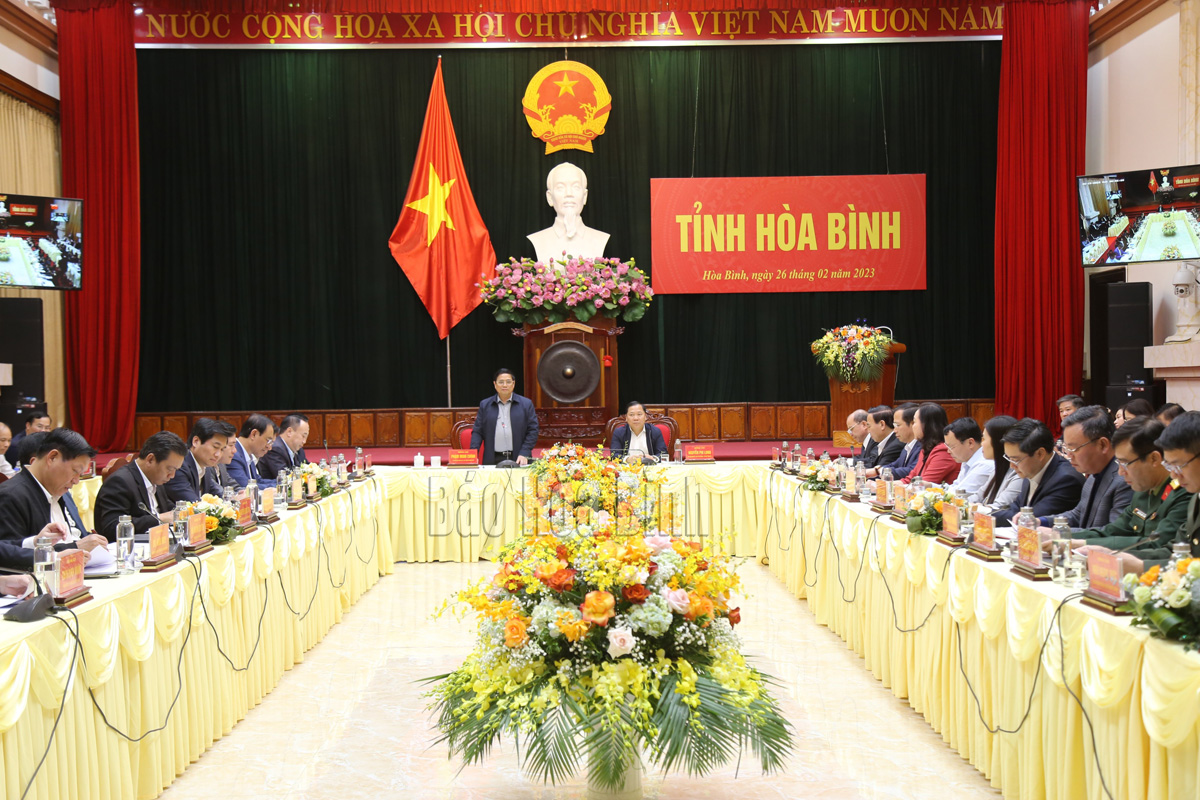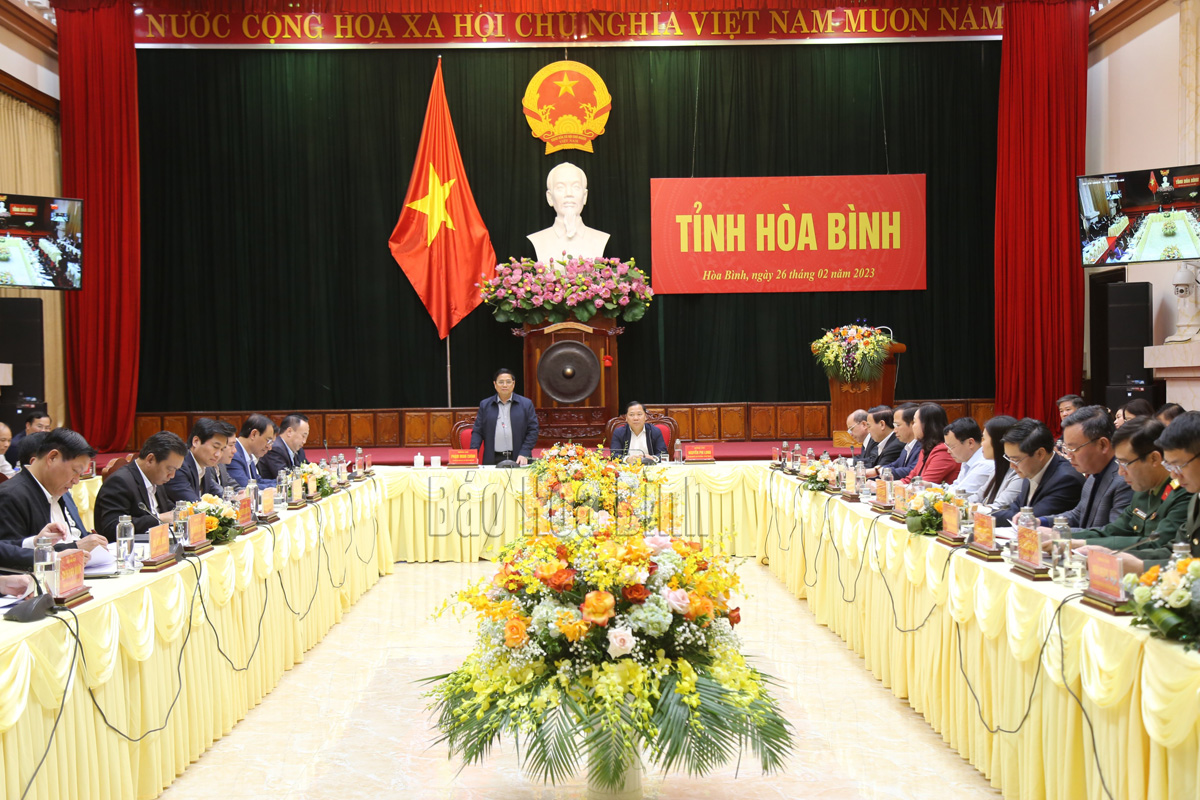
(HBO) – Within the framework of his working visit to Hoa Binh province, Prime Minister Pham Minh Chinh had a meeting with top leaders of the locality. Attending the working session were Minister of Finance Ho Duc Phoc, Secretary of Hoa Binh provincial Party Committee Nguyen Phi Long, Permanent Vice Secretary of the Party Committee and Chairman of the People’s Council Bui Duc Hinh, and Vice Secretary of the Party Committee and Chairman of the People’s Committee Bui Van Khanh, among others.

Prime Minister Pham Minh Chinh speaks at the working
session.
Khanh said that in 2022, under the comprehensive leadership
of the Party Committee and authorities, Hoa Binh fulfilled 18 out of the 19
socio-economic development criteria.
He proposed the Government allow Hoa Binh to compile
dossiers towards the recognition of Trai hamlet cave and ‘Mai da lang Vanh’
(Vanh village’s stone shelter) relic sites in Lac Son district as special
national relic sites, and allow the province to make a dossier to submit to
UNESCO for the recognition of the Hoa Binh civilisation as a world heritage of
humanity. He also suggested the Government have mechanisms and policies to
invest in socio-economic development of communes in specific regions.
Speaking at the meeting, Secretary Long stated that with its
advantages, the provincial Party Committee has identified four strategic
breakthroughs of planning, administrative reform, human resources development
associated with digital transformation, and modern infrastructure development;
and four sustainable growth pillars of tourism, manufacturing, agriculture, and
satellite housing.
Prime Minister Chinh said that Hoa Binh holds many potential
and advantages for economic development and investment attraction, and has
adequate opportunities and conditions to become a more civilised, richer, and
more beautiful locality.
However, the province's economic development has not been
commensurate with its potential and advantages, he noted, adding that the
reason is that Hoa Binh has not been able to connect with the key economic
regions in the north.
He asked the province to bring into full play its potential
and competitiveness advantages, ensure harmony between economic growth and
culture development, social welfare, environmental protection and defence – security
assurance.
The Government leader assigned ministries, sectors, and the
province to take drastic measures to soon complete three regional connectivity
routes: Hoa Binh-Hanoi, Hoa Binh-Moc Chau, and a road connecting Hoa Binh and
Hanoi and Son La expressway.
In the spirit of "Party members go first, the people follow”, all households of Party members in the Doan Ket sub-region in Da Bac town, Da Bac district, voluntarily removed gates and fences, and donated land when the road expansion project passed through their properties. Inspired by their example, 68 households in the sub-region quickly followed suit, contributing over 1,400 sq.m of residential and perennial cropland to widen the main road through the residential area. The exemplary role of Party members in Doan Ket stands as a shining example of studying and following President Ho Chi Minh’s thought, morality, and lifestyle.
The Hoa Binh provincial People's Committee held a monthly meeting on May 29 to assess the implementation of socio-economic development tasks in the first six months of 2025, the progress of key projects, and some other important issues.
During his lifetime, President Ho Chi Minh always expressed his deep affection and special concern for children and youth. He once emphasized: "Caring for and educating children well is the responsibility of the entire Party and the entire people”; "First of all, the family (i.e. grandparents, parents, siblings) must do this job well”. "the Party Committees…, the Children’s Committee, the Youth Union, the education sector, and all related organizations must have specific plans to ensure children grow healthier and more progressive”. His teachings has been remaining valuable and serving as the guiding principles in the work of protecting, caring for, and educating children. In line with this ideology, Hoa Binh Province has continuously been prioritizing and investing resources in the well-being of children in recent years.
Mr. Nguyen Phi Long, the alternate Member of the Party Central Committee and Secretary of the Provincial Party Committee chaired the meeting of the Standing Committee of the Provincial Party Committee to provide opinions on several investment projects within the province. There was the attendance of Ms. Bui Thi Minh, the Permanent Deputy Secretary of the Provincial Party Committee and Chairwoman of the Provincial People’s Council; Mr. Bui Đuc Hinh, the Deputy Secretary of the Provincial Party Committee and Chairman of the Provincial People’s Committee and other members of the Standing Committee; the leaders from other departments, agencies, and some localities.
The Standing Board of the Vietnam Fatherland Front (VFF) Committee of Hoa Binh province held a meeting on May 28 to honour outstanding village elders, village heads, and reputable individuals from local ethnic minority and religious communities.
In mid-May, the provincial Museum organised an exhibition named "Duoi la co Dang Cong san Viet Nam quang vinh” (Under the flag of the glorious Communist Party of Vietnam). This meaningful activity took place in the joyful atmosphere to celebrate the country's major holidays and the Party congresses at all levels for the 2025-2030 term, towards the 14th National Party Congress.



